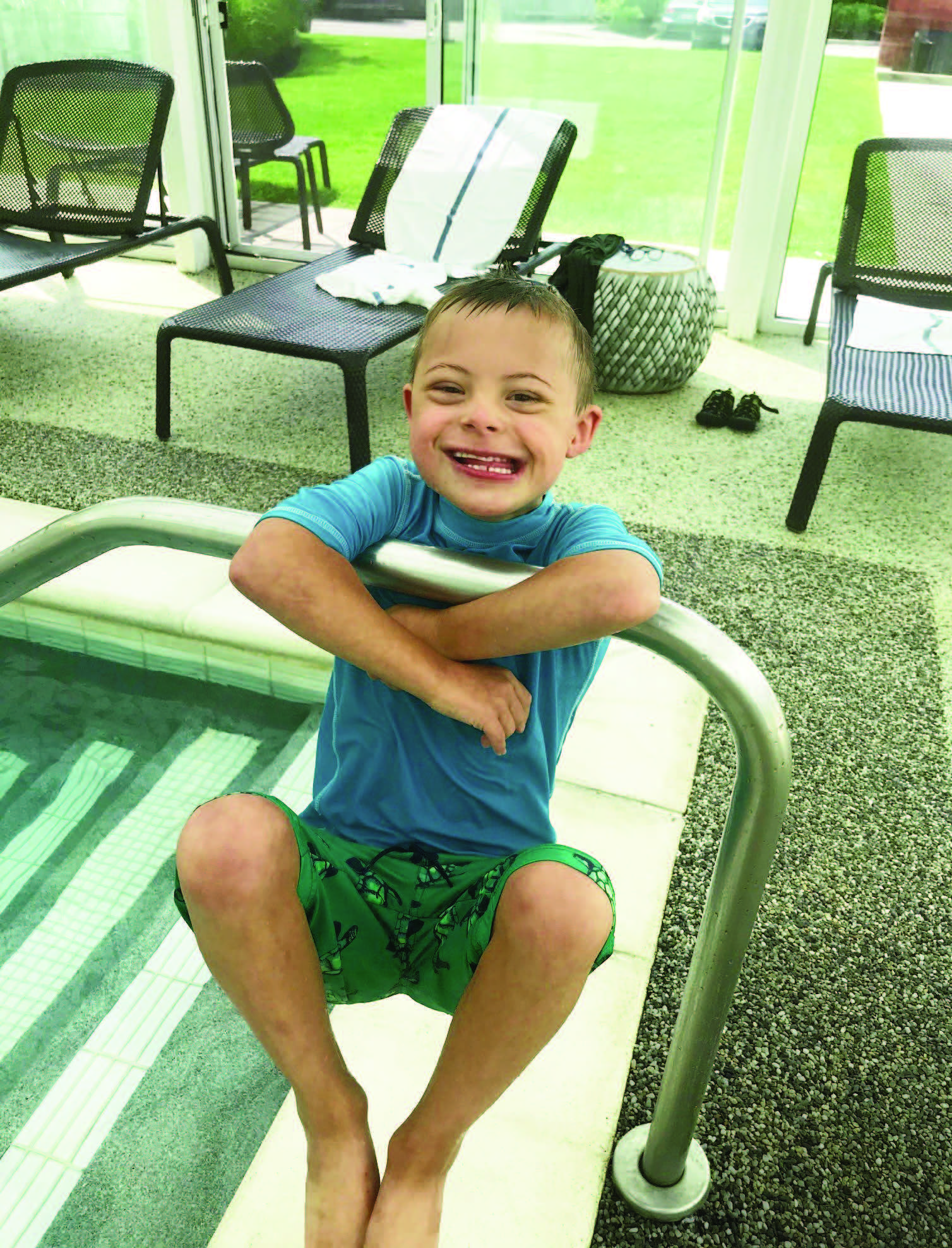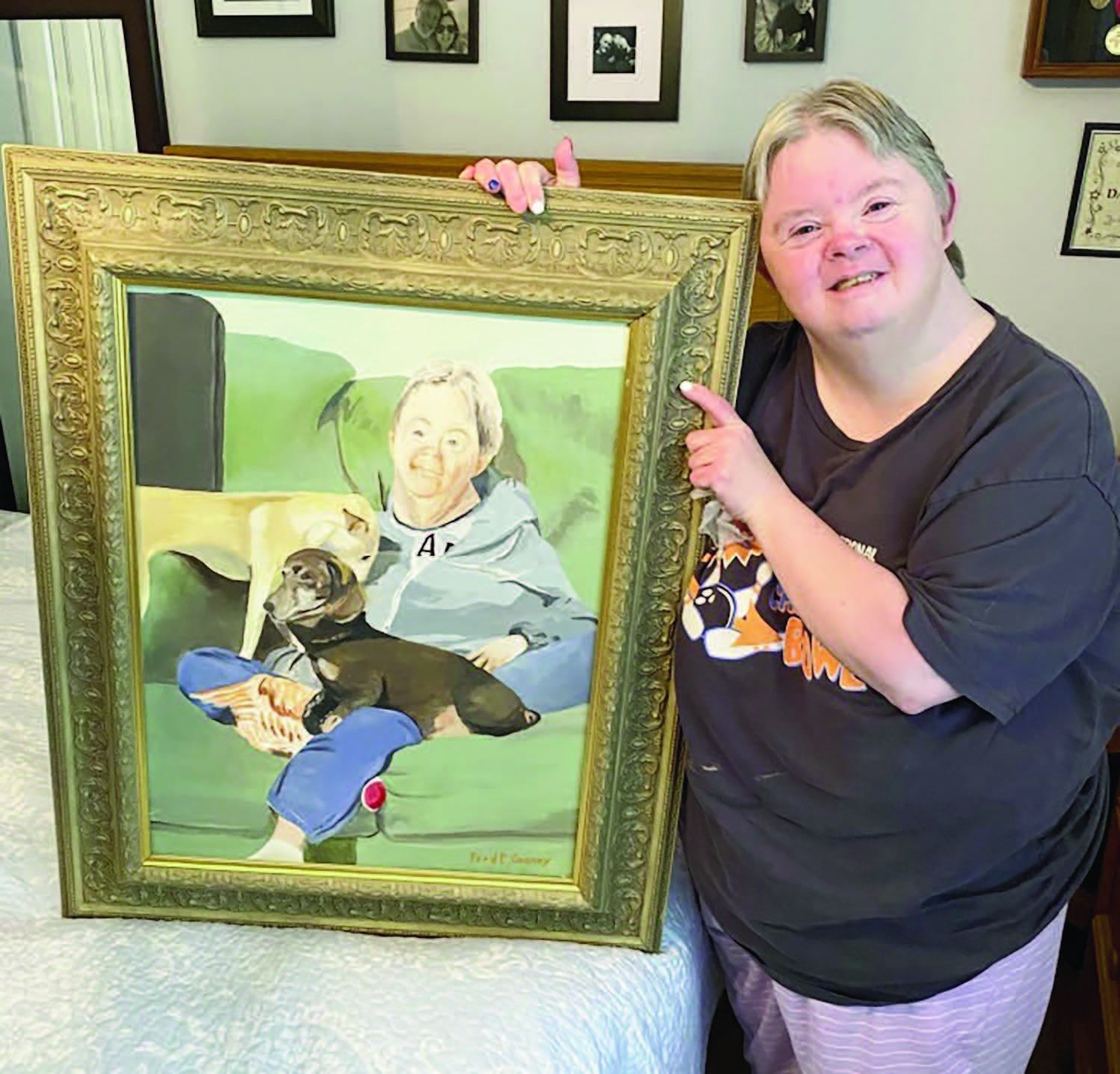
GONNA NEED A BIGGER POOL: Oskar cools off with a midday dip; LuMind IDSC's position is that a larger number of research participants is required in order to achieve a new level of health and independence for our loved ones with Down syndrome
ONE MORE FIGHT
FOR THE DOWN SYNDROME COMMUNITY
BY HAMPUS HILLERSTROM
Like many parents, I have two full-time jobs: "Dad," and my professional career. I am the proud father of seven-year-old Oskar, who has Down syndrome. He lights up every room, is starting to read, and loves puzzles, hugs, and ice cream. Oskar and his younger brother, Sebastian, are a dynamic duo, perfecting the best kind of brotherly mischief, who keep my wife and I fully employed at every hour of the day.
For most families, the parents' daily work – the paycheck-generating work - doesn't have a direct impact on their family. Not so at the Hillerstrom house, where Down syndrome is also my career. I lead LuMind IDSC Foundation, a national non-profit organization that accelerates Down syndrome research and empowers families through resources and connections to address the unmet medical needs of people with Down syndrome. October is Down Syndrome Awareness Month and so, at the intersection of family life, non-profit work, and daily adventures with Down syndrome, I offer my perspective on the vibrant and diverse Down syndrome community with an important call to action: join the battle for increased research participation.
The Down syndrome community in America has already fought, and won, many significant battles. It is because of thousands of previous victories - in public policy, in doctors' offices, in school districts, in the media, and in our own lives – that people with Down syndrome live more independently and longer than ever before. Those battles were fought before my son Oskar was born, and our family will forever be grateful to those who went before and paved the path for us.
Today, I see in our community an opportunity to engage in one more battle: the fight for better research and research participation. Although my personal area of expertise is Down syndrome research, I know other intellectual disabilities communities find themselves in similar circumstances. We are all looking for the science and solutions that will enable our loved ones to live longer, healthier, and more independent lives.
There are many critical medical conditions that affect people with Down syndrome. Alzheimer's disease (AD) and sleep apnea, for example, require improved treatment options, diagnostics, and medical care solutions. Researchers estimate the lifetime risk of Alzheimer's disease (AD) is more than 90%, and AD is the leading cause of death for adults with Down syndrome. Compounding the prevalence of AD in the Down syndrome community is the shockingly early onset of dementia symptoms, typically around age 55. Obstructive sleep apnea, a condition where a person's breathing temporarily stops while asleep, affects between 50-75% of children and adults with Down syndrome. Speech capability is also a common concern for people with Down syndrome, as speech is often delayed and sometimes impaired.
Related to all the medical issues listed above is the overarching issue of personal independence. LuMind IDSC Foundation recently surveyed 400 parents of people with Down syndrome, and nearly 90% of those parents listed "independence with daily living activities" as one of their primary concerns.
While those statistics may seem shocking and depressing to some, I see them as challenges that are possible to overcome. "Possible," because, in addition to having a child with Down syndrome, I also have a front-row seat to the latest developments in Down syndrome research. For me, research in this field is vitally important on both the personal and professional levels.
EXPANDING THE FIELD: In 2016, there was only one clinical trial involving 16 participants that took place in the United States. This year, four clinical trials and observational studies with more than 800 participants are ongoing.
LuMind IDSC works at the crossroads of science and the Down syndrome community by taking a “venture philanthropy” approach to our initiatives, focusing on translational research – the kind that focuses on unmet needs and turns successful laboratory and data discoveries into clinical best practices and new treatment options at local doctors’ offices.

THE BIG PICTUURE: LuMind IDSC Foundation is a national non-profit organization that accelerates Down syndrome research and empowers families through resources and connections to address the unmet medical needs of people, Like Teresa F., with Down syndrome.
At the core of our research initiatives are individuals with Down syndrome, their caregivers, and loved ones. We directly serve the community by offering a wide range of multimedia health, wellness, parenting, and support resources on our free digital library platform, myDSC. We also provide the means for families to be heard in research matters by soliciting input from them and bringing that "family voice" to researchers, pharmaceutical companies, and policymakers.
Beyond these community resources, the three corners of LuMind IDSC's current research activities are: the Down Syndrome Clinical Trial Network (DSCTN), the LuMind IDSC Research Consortium, and the Longitudinal Investigation for the Enhancement of Down Syndrome Research (LIFE-DSR). To date, LuMind IDSC has been involved in 19 clinical trials and observational studies in the past 15 years. We currently collaborate with major pharmaceutical companies to gather important biomarker samples (like brain imaging, spinal fluid, and blood samples) in order to bring Down syndrome data to their work. In addition, LuMind IDSC currently coordinates a multi-year, multi-site research study to track and analyze the medical and physical data of 270 adults with Down syndrome (LIFE-DSR).
Having now established a multi-tiered infrastructure for clinical THE BIG PICTUURE: LuMind IDSC Foundation is a national non-profit organization that accelerates Down syndrome research and empowers families through resources and connections to address the unmet medical needs of people, Like Teresa F., with Down syndrome. research, LuMind IDSC turns to the overwhelming need for people with Down syndrome and their caregivers to participate in research studies. Studies can only move forward when the community responds and participates. Family participation is the key!
To illustrate the growing need for research participation, we can look at studies focused on Down syndrome-associated Alzheimer's disease. In 2016, there was only one clinical trial involving 16 participants that took place in the United States. This year, four clinical trials and observational studies with more than 800 participants are ongoing. In the next few years, with the increasing interest from National Institutes of Health (NIH) and pharmaceutical companies to find Alzheimer's treatment solutions for people with Down syndrome, experts expect three to five new clinical trials starting. An average trial requires between 75 and 500 participants. Because these study trials will have strict qualifying parameters, we estimate that we need a ten-fold increase in research participation by individuals with Down syndrome and their caregivers over the next five years.
Meeting a challenge of this magnitude is a battle our community must fight together. As Oskar's father, and as a leader in Down syndrome research, I call on families to consider participating in research studies and clinical trials. I realize research participation is a lot to ask, especially for those parents, now in their retirement years, who are veterans of the early fights, and whose children blazed a trail for Oskar's generation. But I appeal to the parents and siblings of adults with Down syndrome: please join us for one last battle.
Working together, we can achieve a new level of health and independence for our loved ones with Down syndrome and for the generations that come after us. Community readiness and participation in research are the key to achieving therapeutic, medical, and diagnostic advances for all. You can read more about LuMind IDSC at lumindidsc.org and you can request information, or register for our newsletter, here: lumindidsc.org/s/1914/20/interior.aspx?sid=1914&gid=2&pgid=609 •
ABOUT THE AUTHOR:
Hampus Hillerstrom is President/CEO of LuMind IDSC Foundation. Previously, he co-founded and served in executive roles at biotech company Proclara Biosciences. He also worked at venture capital firm HealthCap, pharma company AstraZeneca, and investment bank Lazard. Hampus holds a master's degree in economics from University of St. Gallen, MBA from Harvard Business School, and MSc in Health Sciences and Technology from MIT/Harvard. Hampus lives in the Boston area with his wife and children. Their oldest son, Oskar, has Down syndrome.